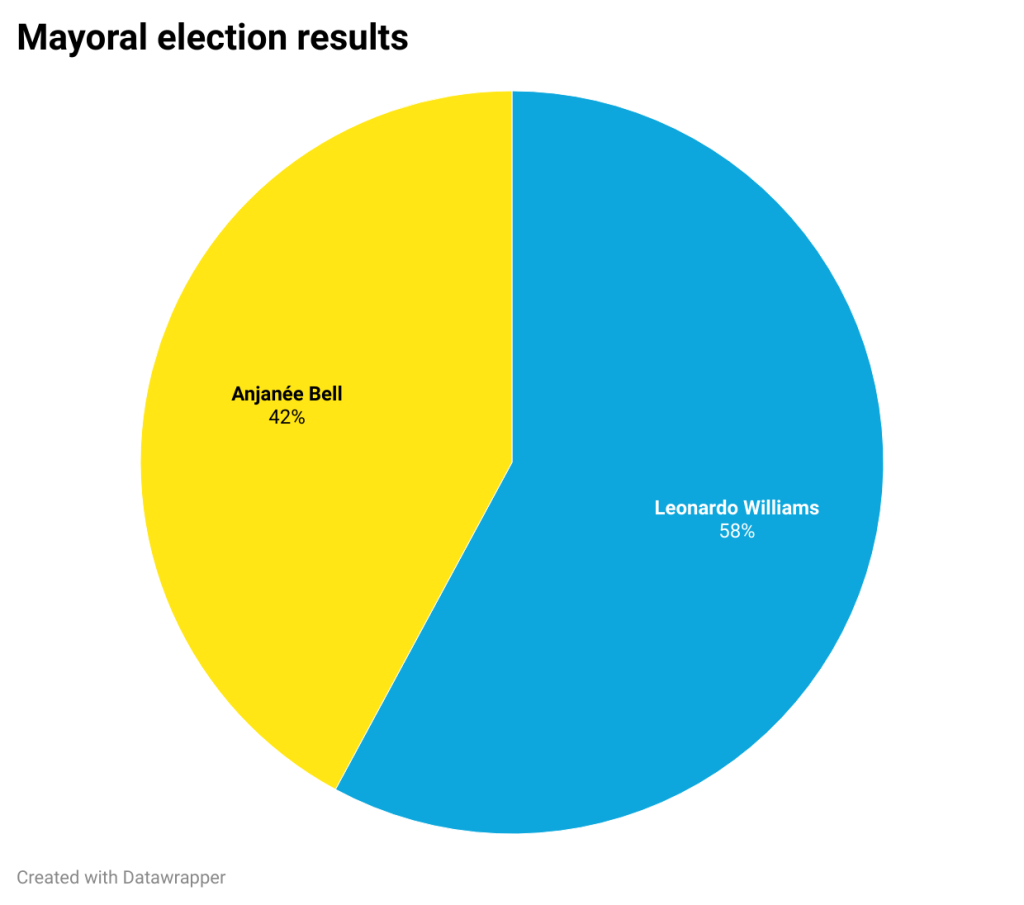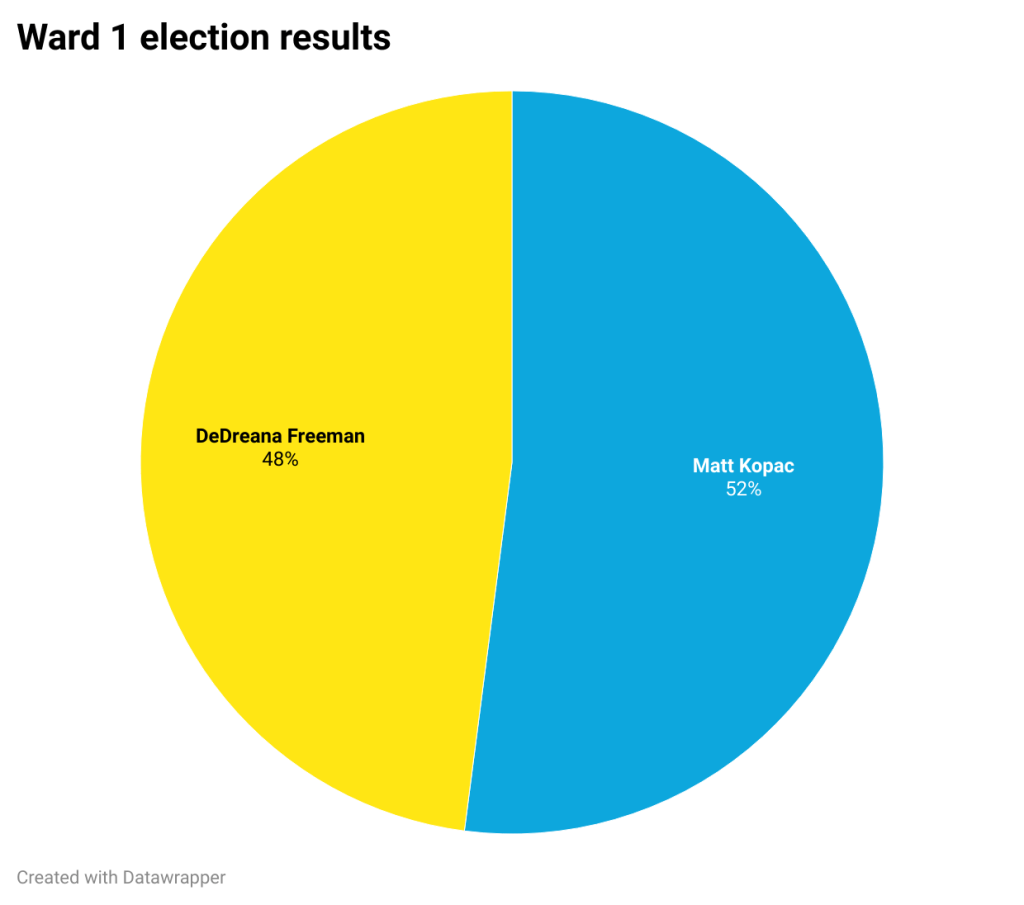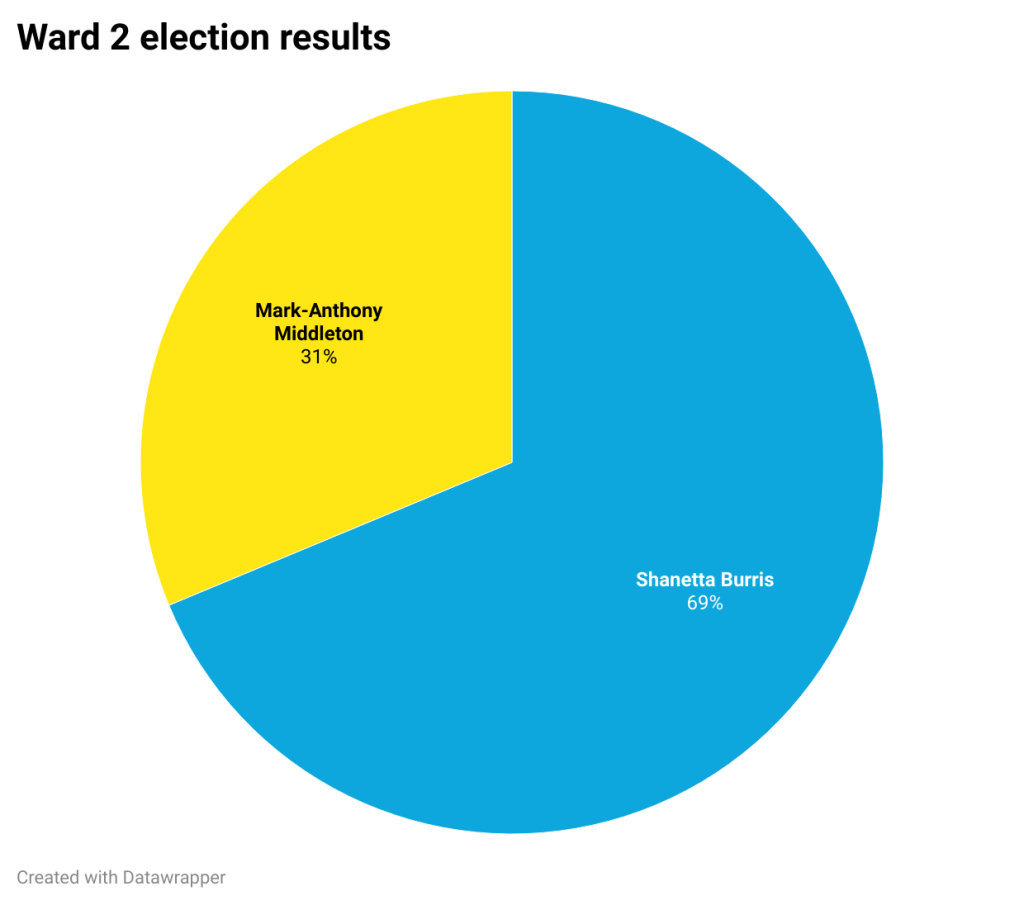Durham elections crossed the finish line on November 4, resulting in the return of some familiar faces and the introduction of new leadership in city hall.
Mayor Leonardo Williams won his bid for reelection over challenger Anjanée Bell, and incumbent Ward 3 representative Chelsea Cook won decisively over Diana Medoff to earn their first full term on council.
Two other sitting councilors, DeDreana Freeman and Mark-Anthony Middleton, were ejected from their seats. Freeman lost a close contest against Matt Kopac in Ward 1, and Shanetta Burris won handily in Ward 2 against Middleton.
The knock-down, drag-out competition was expensive and, at times, ugly. Now that the dust has settled, the seven-member body must turn campaign stump speeches into substantive policy decisions. The battle may be won, but the war for Durham’s future wages on.
Here are five takeaways from Durham’s municipal election.
1. It’s the end of an era.
After a productive, albeit contentious, eight years, Freeman and Middleton’s watch has ended. Durham voters welcomed new voices to Ward 1 and Ward 2, electing Kopac and Burris to those respective seats, held by the incumbents since 2017.
Middleton, a pastor and podcast host, brought an orator’s verve to city hall. The mayor pro tem is frequently the councilor who will go deep on explaining the nuances of city policy and the limitations the council faces. But his willingness to be matter-of-fact in the face of deeply emotional discussions about Durham development, crime, and other issues often made him the “bad cop” during meetings, and he started to lose efficacy with a growing faction of Durham residents.
On election night, Middleton told the INDY he felt his “brand took some hits” that soured his relationship with some residents, even though he continued to have the support of other leaders and electeds in the community, past and present.
Freeman, often positioned as Middleton’s foil, has a loyal fan base and has kept equity at the forefront since she was elected in 2017. But her brand also suffered a few setbacks over the years, including frequent tit for tats with Middleton on the dais. Their candidacies became avatars for the disagreements about Durham’s future prospects. In some ways, it felt as though their fates were intertwined. One could not survive without the other.
2. In line with national trends, turnout was high.
Turnout was unusually high, especially for an odd-year election cycle. About 46,000 voters cast ballots (a bit over 21 percent of eligible voters ), which followed an encouraging trend of civic engagement nationwide on Tuesday. In recent Durham elections, that number was almost 19 percent in November 2023 and about 15 percent in November 2021.
In Ward 1, the most contested race, Kopac and Freeman were only separated by 1,841 votes. Kopac did well in southwest Durham neighborhoods like Hope Valley and Old West Durham that make up Ward 3, whereas Freeman locked up most of east and southeast Durham, which is a majority of Ward 2 and covers Hayti and the neighborhood around North Carolina Central University.
For ballots cast on Election Day by Ward 1 voters specifically, Kopac received just 741 more votes than Freeman out of 10,247 cast (which does not include write-in or early votes).
According to the city website, the ward system was created to “provide representation for different areas of the city.” Even though the candidates must live in the ward they seek to represent, all voters can select candidates in all three ward races.



3. How the new council will vote on development isn’t clear-cut.
Development was the defining issue this election cycle. Not only did candidates have to stake out a position on how to manage Durham’s accelerating growth, but whether candidates took funding from the real estate or development fields was a crucial litmus test for many voters who believed it suggested how candidates would approach zoning and development.
The current council often agrees on rezoning cases, but when they split, it tends to be four in favor and three against, with Middleton firmly in the majority and Freeman firmly in the minority. Both Burris and Kopac have talked about bringing a balanced approach to the rezoning cases that come before the city council.
Even with Kopac’s record on the Durham Planning Commission to pull from, it’s unclear whether the new electeds will drastically change the vote split, even if they vote differently from their respective predecessors. Still, now that Kopac and Burris are officially headed to city hall, nuance is precisely what will be required to form effective policies that satisfy Durham’s growing needs.
An important tool for how city council manages growth is the Unified Development Ordinance (UDO), a legal document that sets the laws for development in Durham. Kopac, Burris, and the rest of council will oversee the adoption of the new UDO early next year, which could significantly impact the types of cases brought before them. How will the incoming council roster put their stamp on the UDO, and what outcomes might it yield for present and future Durham residents?
4. Less money didn’t mean more problems.
In season 1 of The Wire, Detective Lester Freamon tells his colleagues, “You follow drugs, you get drug addicts and drug dealers. But you start to follow the money, and you don’t know where the f*ck it’s gonna take you.”
In Durham, the paper trail led to small donors, other elected officials, people in real estate and development, and a handful of whales making a splash.
Money raised did not directly correlate with success, mimicking outcomes in nearby Cary. Kopac raised the most of any candidate and three times Freeman’s haul, yet won by only a slim margin. Burris raised the least of any candidate and one-sixth of Middleton’s total, yet won with nearly twice as many votes and greatly increased her victory margin between the primary and general election.
In Ward 3, challenger Medoff raised nearly four times as much as incumbent Cook, and the second most of any candidate in the race, yet she lost by the widest margin of any contestant in the general election.
Fundraising transparency is sorely needed at all levels of government. This election season saw the emergence of a mysterious new 501(c)(4) called Yes for Durham, causing a firestorm of speculation about how “dark money” had infiltrated Bull City politics. Candidates distanced themselves from the PAC, but conspiracies had already seeped into the atmosphere.
During her victory speech on Tuesday night, Burris decried the amount of money flowing through local elections and said she would work to “fight back and push against big money.”
5. The new council will be fresh, but not unqualified.
With the ousting of Middleton and Freeman, Durham City Council lost a combined 16 years of experience, leaving Javiera Caballero as the longest-tenured member and the only with more than a full term under their belt other than Williams. Williams will likely tap Caballero to replace Middleton, his friend and close confidant, as mayor pro tem, giving her the responsibility of presiding over meetings and acting as mayor in his absence. As the veteran council member, Caballero could also inherit the role of “explainer” during public hearings.
The council roster is relatively young compared to eras of the past led by elder statesmen and stateswomen like Bill Bell, Steve Schewel, Cora Cole-McFadden, and Eddie Davis, who had years of public service. But youth and inexperience shouldn’t be mistaken for an inability to perform the job. This incoming city council brings a plethora of skills—in the areas of sustainability, eviction law, urban planning, economic development, community organizing, and more—that they can leverage to tackle the city’s most consequential issues.
Follow Reporter Justin Laidlaw on X or send an email to [email protected]. Comment on this story at [email protected].
